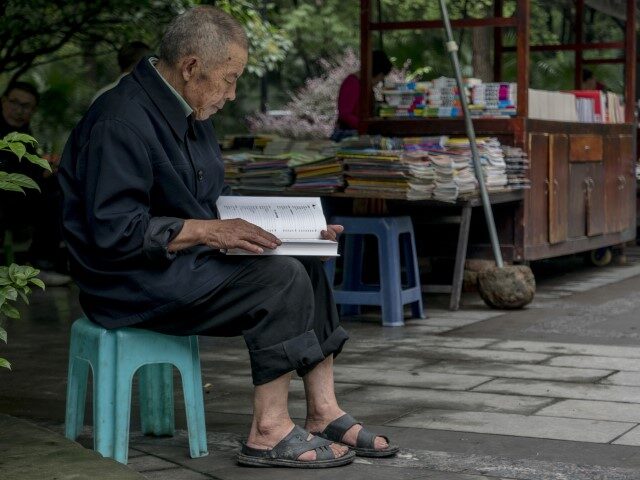China’s state-run Global Times on Monday reported that the communist government is planning to raise its retirement age for the second time in its history.
State media hailed the move as wisely acknowledging the “voluntariness” and “flexibility” of the Chinese people, but of course it is mostly an acknowledgement of demographic reality, as a smaller cohort of working young people simply cannot fund the benefits for a growing population of retirees.
The Global Times said the resolution to raise the retirement age was adopted by the Central Committee of the Communist Party of China to “actively address an aging population and promote the development of pension and elderly care industries.”
“Experts reached by the Global Times said the decision, abolishing the one-size-fits-all approach, respects individual preferences and aligns objectively with today’s increasingly diverse society,” the article added.
Chinese officials placed a heavy emphasis on “voluntariness” to convey the impression they will not be forcibly marching retirees back into the workforce. “Flexibility” was also stressed, to assure nervous seniors that if they decide to start working again, they can choose undemanding positions with light work schedules.
China currently has one of the lowest retirement ages in the world – 50 for blue-collar women, 55 for female professionals, and 60 for men. Retirement at those ages is mandatory. These retirement ages have been in effect for roughly 70 years. The original retirement age for the People’s Republic of China, when the Communists seized power in 1949, was 77, but the life expectancy back then was only 35.
“Many developed countries have adopted flexible retirement systems, focusing mainly on using economic means to create incentives and constraints to adjust retirement ages. After reaching the statutory retirement age, if an employee is healthy and willing to continue working, the employer cannot refuse. Additionally, for those who retire later, the government may even provide incentives such as pension benefits,” the Global Times said wistfully.
The BBC noted that for all of Chinese state media’s happy talk about devising flexible and voluntary employment programs so retirees can follow their hearts and keep working if they really want to, the cold truth is that China’s pension funds are running out of money.
The Chinese Academy of Social Sciences predicted in 2019 that the main state pension fund would go broke in 2035, and that was before the enormous financial stresses imposed by the Wuhan coronavirus pandemic. Some local governments are in even worse shape. Eleven of China’s 31 provincial governments are already running deficits in their pension funds.
China’s birth rates are also declining faster than government planners predicted five years ago, while its life expectancy is high at 78 years on average, so the population is aging more rapidly. There are more retirees, and fewer younger workers to support them.
The Global Times did not quote any details about precisely when the retirement age would be raised, or how high, but the BBC quoted a China Pension Development Report from late 2023 that suggested “65 years old may be the final result after adjustment.” The new retirement age could be the same for both men and women.
Some Chinese citizens responded to the retirement age plan by perceptively noting that a “voluntary” and “flexible” system would probably see people working in grueling jobs choosing to retire earlier, while those with easier and more lucrative jobs would keep working – and that would leave young Chinese with even lousier choices of employment than they already face.
China already has terrible problems with youth unemployment, bad enough to make young people drop out of the job market entirely to become “full-time children” or complain about the futility of living in the “garbage time of history.” Keeping more older, experienced workers employed could leave even fewer jobs for desperate young people.
“Those who wish to retire early are burnt out from their laborious jobs, but those who are in comfortable, lucrative roles will not choose to retire. What kind of jobs will the younger generation end up with?” asked a Chinese social media post quoted by the BBC.
“Delaying retirement faces opposition from some, particularly those with lower incomes and uneasy working conditions; after age 50, their wages remain low with limited growth potential, so they prefer to retire early and start receiving pensions sooner,” Fudan University economics professor Feng Jin told the South China Morning Post (SCMP) on Monday, expressing the same idea in more clinical terms.
The authoritarian Chinese regime has no qualms about barking orders at its subjects, so the extremely tentative approach it is taking toward raising the retirement age suggests the Chinese Communist Party is worried about enraging the public.
As with all retirement and benefit reform plans around the world, there is certain to be pushback from people who feel they have earned the more generous benefits of the old plan through a lifetime of hard work. No one wants to be the first generation required to work five or ten years longer, or collect fewer benefits than the previous generation received.
Tentatively or not, the Chinese government will eventually have to make some changes. Reuters noted on Monday that Chinese government figures show the over-60 cohort will increase from 280 million seniors today to over 400 million by 2035 – an increase larger than the entire populations of the United States and United Kingdom combined.
China has about five workers per retiree today, which is half the ratio from ten years ago, and it will decrease to four workers per retiree by 2030, and possibly to two to one by 2050. There is no way to sustain retirement benefits with such a low number of workers per beneficiary.

COMMENTS
Please let us know if you're having issues with commenting.